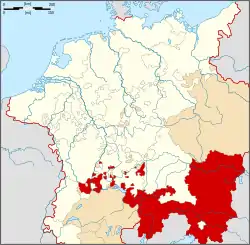County of Tyrol
The (Princely) County of Tyrol was an estate of the Holy Roman Empire established about 1140. Originally a jurisdiction under the sovereignty of the Counts of Tyrol, it was inherited by the Counts of Gorizia in 1253 and finally fell to the Austrian House of Habsburg in 1363. In 1804 the Princely County of Tyrol, unified with the secularised prince-bishoprics of Trent and Brixen, became a crown land of the Austrian Empire in 1804 and from 1867 a Cisleithanian crown land of Austria-Hungary.
(Princely) County of Tyrol | |||||||||||||||
|---|---|---|---|---|---|---|---|---|---|---|---|---|---|---|---|
| 1140–1919 | |||||||||||||||
 Flag
| |||||||||||||||
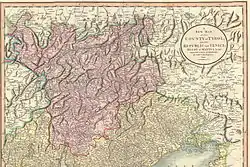 Map of the County of Tyrol (1799) | |||||||||||||||
| Status | State of the Holy Roman Empire (until 1806), Crown land of the Habsburg Monarchy, of the Austrian Empire (from 1804) and of Cisleithanian Austria-Hungary (from 1867) | ||||||||||||||
| Capital | Meran, formally until 1848 Innsbruck, residence from 1420 | ||||||||||||||
| Common languages | Southern Bavarian, Italian (Venetian variant) | ||||||||||||||
| Government | County | ||||||||||||||
| Historical era | Middle Ages | ||||||||||||||
• Created County | 1140 | ||||||||||||||
| 1363 | |||||||||||||||
• Joined Austrian Circle | 1512 | ||||||||||||||
• Incorporated Trent and Brixen | 1803 | ||||||||||||||
• Restored to Austria | 1814 | ||||||||||||||
| September 10, 1919 | |||||||||||||||
| |||||||||||||||
Part of a series on the |
|---|
| History of Austria |
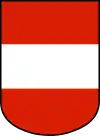 |
|
|
Today the territory of the historic crown land is divided between the Italian autonomous region of Trentino-Alto Adige/Südtirol and the Austrian state of Tyrol. Both parts are today associated again in the Tyrol–South Tyrol–Trentino Euroregion.
History
Establishment
At least since German king Otto I had conquered the former Lombard kingdom of Italy in 961 and had himself crowned Holy Roman Emperor in Rome, the principal passes of the Eastern Alps had become an important transit area. The German monarchs regularly travelled across Brenner or Reschen Pass on their Italian expeditions aiming at papal coronation or the consolidation of Imperial rule.
In 1004 King Henry II of Germany separated the estates of Trent from the North Italian March of Verona and vested the Bishops of Trent with comital rights. In 1027 Henry's Salian successor, Emperor Conrad II, granted the Trent bishops further estates around Bozen and in the Vinschgau region; at the same time, he vested the Bishop of Brixen with the suzerainty in the Etschtal and Inntal, part of the German stem duchy of Bavaria under the rule of Conrad's son Henry III. Especially the Brixen bishops remained loyal supporters of the Salian rulers in the Investiture Controversy and in 1091 also received the Puster Valley from the hands of Emperor Henry IV.

Documented from about 1140 onwards, the comital dynasty residing in Tyrol Castle near Meran held the office of Vogts (bailiffs) in the Trent diocese. They extended their territory over much of the region and came to surpass the power of the bishops, who were nominally their feudal lords. After the deposition of the Welf duke Henry X of Bavaria in 1138, the Counts of Tyrol strengthened their independence. When Henry the Lion was again enfeoffed with the Bavarian duchy by Emperor Frederick Barbarossa at the 1154 Imperial Diet in Goslar, his possessions no longer comprised the Tyrolean lands. The Counts maintained that independence under the rising Bavarian Wittelsbach dynasty. In 1210, Count Albert IV of Tyrol also took over the Vogt office in the Bishopric of Brixen, prevailing against the rivalling Counts of Andechs.
Gorizia-Tyrol
In 1253 Count Meinhard of Gorizia (Görz) inherited the Tyrolean lands by his marriage to Adelheid, daughter of the last Count Albert IV of Tyrol. When their sons divided their estate in 1271, the elder Meinhard II took Tyrol, for which he was recognized as an immediate lordship. He supported the German king Rudolph of Habsburg against his rival King Ottokar II of Bohemia. In reward, he received the Duchy of Carinthia with the Carniolan march in 1286.
In 1307 Meinhard's son Henry was elected King of Bohemia, After his death, he had one surviving daughter, Margaret Maultasch, who could gain the rule only over Tyrol. In 1342 she married Louis V of Wittelsbach, then Margrave of Brandenburg. The red eagle in Tyrol's coat of arms may derive from the Brandenburg eagle at the time when she and her husband ruled Tyrol and Brandenburg in personal union, though the Tyrolean eagle had already appeared in the 13th century.
Louis V died in 1361, followed by Margaret's son Meinhard III two years later. Lacking any descendants to succeed her, she bequeathed the county to Rudolph IV of Habsburg, Duke of Austria in 1363. He was recognized by the House of Wittelsbach in 1369. From that time onward, Tyrol was ruled by various lines of the Austrian Habsburg dynasty, who held the title of Count.
Austria
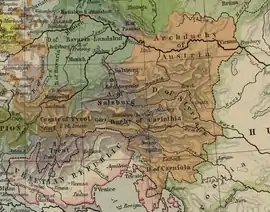
After the Habsburg hereditary lands had been divided by the 1379 Treaty of Neuberg, Tyrol was ruled by the descendants of Duke Leopold III of Austria. After a second division within the Leopoldinian line in 1406, Duke Frederick IV of the Empty Pockets ruled them. In 1420 he made Innsbruck the Tyrolean residence. In 1490 his son and heir Sigismund renounced Tyrol and Further Austria in favour of his cousin German king Maximilian I of Habsburg. By then Maximilian I had re-united all Habsburg lands under his rule. In 1500 he also acquired the remaining Gorizia (Görz) territories around Lienz and the Puster Valley.
When Emperor Ferdinand I of Habsburg died in 1564, he bequeathed the rule over Tyrol and Further Austria to his second son Archduke Ferdinand II. Both territories thereafter fell to the younger sons of the Habsburg Emperors: Archduke Matthias in 1608 and Maximilian III in 1612. After the death of Archduke Sigismund Francis in 1665, all Habsburg lands were again under the united rule of the Emperor Leopold I.
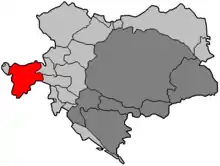
From the time of Maria Theresa of Austria (1740−1780) onward, Tyrol was governed by the central government of the Habsburg Monarchy at Vienna in all matters of major importance. In 1803 the lands of the Bishoprics of Trent and Brixen were secularised and incorporated into the county.
Napoleonic Wars
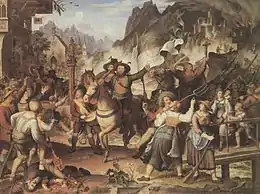
Following defeat by Napoleon in 1805, Austria was forced to cede Tyrol to the Kingdom of Bavaria in the Peace of Pressburg. Tyrol as a part of Bavaria became a member of the Confederation of the Rhine in 1806. The Tyroleans rose up against the Bavarian authority and succeeded three times in defeating Bavarian and French troops trying to retake the country.
Austria lost the war of the Fifth Coalition against France, and got harsh terms in the Treaty of Schönbrunn in 1809. Glorified as Tyrol's national hero, Andreas Hofer, the leader of the uprising, was executed in 1810 in Mantua. His forces had lost a third and final battle against the French and Bavarian forces. Tyrol remained under Bavaria and the Napoleonic Kingdom of Italy for another four years.
In 1814, by decisions of the Congress of Vienna, Tyrol was reunified and returned to Austria. It was integrated into the Austrian Empire. From 1867 onwards, it was a Kronland (Crown Land) of Cisleithania.
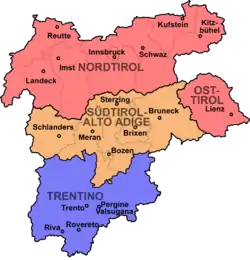
End of the County
After World War I, the victors settled border changes. The Treaty of Saint-Germain of 1919 ruled according to the 1915 London Pact, that the southern part of the Austrian crown land of Tyrol had to be ceded to the Kingdom of Italy, including the territory of the former Trent bishopric, roughly corresponding to the modern-day Trentino, as well as the south of the medieval Tyrol county, the present-day province of South Tyrol. Italy thus took control of the strategically important Alpine water divide at the Brenner Pass and over the south of Tyrol proper with its large German-speaking majority.[1] Since 1949 both parts form the autonomous Italian Trentino-Alto Adige/Südtirol region. The northern part of Tyrol retained by the First Austrian Republic today forms the Austrian State of Tyrol with its East Tyrol exclave.
In 1945 following World War II, Austrian attempts and South Tyrolean petitions to reunite South Tyrol with Austria were not successful. Italy kept control. From 1972 onwards, the Italian Republic has granted further autonomy to the Trentino - Alto Adige/Südtirol province.
Counts of Tyrol
- Albert I –1078
- Albert II 1055–1101
- Albert III 1101–1165
- Berthold I 1165–1180
- Berthold II 1180–1181
- Henry I 1180–1202
- Albert IV 1202–1253, son .
Male line extinct.
House of Meinhardin
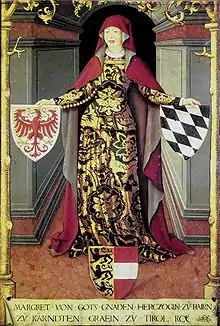
County bequeathed to Albert's son-in-law:
- Meinhard I 1253–1258, also Count of Gorizia since 1231
- Meinhard II 1258–1295, also Count of Gorizia until 1271, Duke of Carinthia and Margrave of Carniola from 1286, jointly with:
- Albert V 1258–1271, brother, also Count of Gorizia until 1304
- Albert VI, son, until 1292
- Henry II 1295–1335, son of Meinhard II, also Duke of Carinthia, King of Bohemia 1306 and 1307–1310, jointly with his brothers
- Louis, until 1305
- Otto, until 1310
Male line extinct, Countess Margaret, daughter of Henry II, married to:
- John Henry of Luxembourg 1335–1341;
divorced, secondly to:
- Louis of Wittelsbach 1341–1361, also Margrave of Brandenburg 1323–1351, Duke of Bavaria from 1347, succeeded by
- Meinhard III 1361–1363, son.
Line extinct.
House of Habsburg
County bequeathed to
- Rudolph IV of Habsburg 1363–1365, also Duke of Austria, Styria and Carinthia since 1358, Duke of Carniola from 1364
- Leopold I 1365–1386, brother, also Duke of Austria until 1379, Duke of Styria, Carinthia and Carniola (Inner Austria according to the 1379 Treaty of Neuberg), jointly with his brother
- Albert IV until 1379, sole Duke of Austria from 1379
- William 1386–1406, son of Leopold I, also ruler of Inner Austria, jointly with his brother
- Leopold II 1396–1406, regent of Tyrol and Further Austria (until 1402), regent of Austria from 1406
- Frederick of the Empty Pockets 1406–1439, brother, also regent of Further Austria since 1402
- Sigismund 1439–1490, son, also ruler of Further Austria, deposed
Line extinct, Habsburg lands re-unified under
- Maximilian I 1490–1519, King of Germany (King of the Romans) since 1486, Archduke of Austria from 1493, Holy Roman Emperor ("Emperor-elect") from 1508.
[...]

Habsburg regents of Tyrol and Further Austria:
- Ferdinand II 1564–1595, second son of Emperor Ferdinand I
- Maximilian III 1612–1618, son
- Leopold V 1619–1632, younger brother of Emperor Ferdinand II
- Ferdinand Charles 1632–1662, son, with his mother
- Claudia de' Medici 1632–1646, as regent
- Sigismund Francis 1663–1665, brother
Line extinct, Habsburg lands re-unified under
- Leopold I 1665–1705, Holy Roman Emperor since 1658.
[...]
See also
References
- Oscar Benvenuto (ed.): "South Tyrol in Figures 2008", Provincial Statistics Institute of the Autonomous Province of South Tyrol, Bozen/Bolzano 2007, p. 19, Table 11
External links
![]() Media related to County of Tyrol at Wikimedia Commons
Media related to County of Tyrol at Wikimedia Commons

